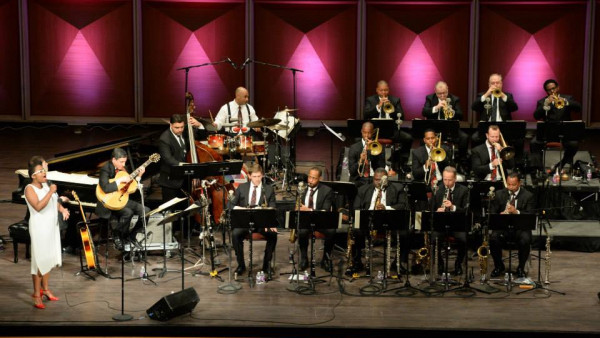Wynton Marsalis, Milwaukee Symphony president talk about musical outreach
Trumpeter Wynton Marsalis, who will lead the Jazz at Lincoln Center Orchestra in a holiday concert Monday at the Marcus Center, has a fan in Milwaukee Symphony Orchestra president Mark Niehaus.
Niehaus, who spent many years as MSO principal trumpeter before moving into administration, studied music at the New Orleans Center for Creative Arts under Wynton’s father, pianist Ellis Marsalis.
Both Marsalis and Niehaus think about how their respective institutions can uphold artistic quality while also reaching out to underserved audiences. After his Marcus Center concert, Marsalis will participate in a reception fundraiser for the newly formed Black Arts Think Tank.
At the Milwaukee Journal Sentinel’s request, Niehaus called Marsalis recently to talk about their mutual musical interests. Their dialogue has been lightly edited and condensed for clarity.
Niehaus: Are you finding yourself filling that same role of identifying young talent and taking them on the road and leading them to their careers as Art Blakey did for you?
Marsalis: Not so much as what Art Blakey did. But as an institution, (Jazz at Lincoln Center) puts on 3,000 education events a year. We have a jazz band festival with high school bands all over the country. We have a whole coterie of young musicians who are working in different contexts. Like Cécile McLorin Salvant, who won the Thelonious Monk competition (in 2010). She’s an unbelievable talent. (Salvant is singing with the Jazz at Lincoln Center Orchestra at Monday’s concert.)
Niehaus: As you travel, are you finding that interest in jazz on a high school level is increasing, steady or declining?
Marsalis: I don’t really know. I don’t calibrate it that way. We’re the conservators of the art, just like your role at the symphony. You’re not out trying to see what the next popular trend is, you’re the symphonic orchestra, which is supposed to be one of the pillars of culture in your city. For the health of your city, it’s your job to make sure orchestral and symphonic music is heard.
Niehaus: You are speaking my language. I use the analogy that the orchestra can be very much like a canary in a mine. The health of the orchestra in many ways mimics the health of the city. I’ll often say, you can’t find a great city that doesn’t have a great orchestra, but you can find a great city that maybe doesn’t have a baseball team or a basketball team.
That’s one of the conversations happening in our city right now, the decision whether or not to invest in a new arena for the Milwaukee Bucks, which is starting this entire conversation around supporting the entertainment and cultural institutions in our city and the value of each in relation to one another.
Marsalis: Right. We do good in our country with sports. We don’t do the same with culture. We have to reach out and go into the community and be actively involved in education and be an active part of everything that goes on, from playing in prisons, hospitals, homes for the elderly. We have to become active. We can’t sit back and wait for someone to take care of it. We have to be very aggressive about our space in the community. And because we’re dealing with the arts, it requires education.
Niehaus: You just described the Milwaukee Symphony’s December concert schedule by the way, hospitals and homes and going out on our holiday tour around Milwaukee where we bring the music out to many people who can’t get out.
Marsalis: That’s what needs to be done. We need to engage the business community, too, so they see the symphonic orchestra is central to the life of the culture. For people to sit in the concert hall for two hours in concentration and be quiet, there’s nothing wrong with that. We need our citizenry to be able to come together and listen to some music, embrace the art of music, not just music as a commercial artifact.
By Jim Higgins
Source: Journal Sentinel

